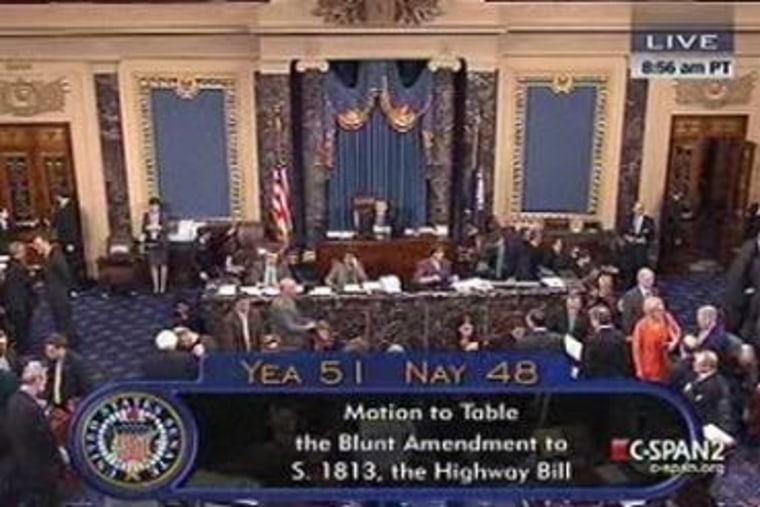Opponents of the anti-contraception Blunt Amendment needed a simple majority on the Senate floor this morning. They got it, but just barely.
The proposal failed on a 51-48 vote. (The procedural mechanics were a little awkward: "yes" votes were against the amendment -- "yes" they wanted to table it.)
Most members voted along party lines, but not all. One Republican, Maine's Olympia Snowe, broke ranks to oppose the measure. Meanwhile, three Democrats -- West Virginia's Joe Manchin, Nebraska's Ben Nelson, and Pennsylvania's Bob Casey -- sided with the right.
Casey was the only real surprise here, though it's worth noting that he's an opponent of abortion rights who's running for re-election this year. Snowe and Nelson, by the way, are both retiring at the end of this term, and were free to vote however they pleased.
And what of the other so-called Republican moderates? Massachusetts' Scott Brown championed the far-right measure and voted with his party; Maine's Susan Collins backed the amendment despite reservations; and Illinois' Mark Kirk is still recovering from his recent stroke and was the only member to not vote today.
It led Greg Sargent to raise a good point:
Olympia Snowe's announced retirement has prompted a great deal of hand-wringing about how supposed "centrist" politicians no longer have any meaningful role to play in Washington. The demands for ideological purity on both sides, we're told, have grown so strident that the possibility of bipartisan compromise has vanished.But here you have a case where one of these "centrists" decided not to opt for the compromise position, and instead is going with the extreme one. Obama's compromise is supported by six in 10 Americans, including 67 percent of independents, according to a new Kaiser poll. The Blunt position, by contrast, is the ideologically rigid one.
Greg was referring to Collins, but clearly the same sentiment applies, at a minimum, to Scott Brown.
Vulnerable Republican incumbents -- including Brown and Nevada's Dean Heller, who also voted with his party today -- will likely see the issue used against them in the fall.
Indeed, the campaign ads practically write themselves. After all, the Blunt Amendment, championed by Missouri Sen. Roy Blunt (R), which would allow all private-sector employers to deny any health services that businesses might find morally objectionable. Forty eight senators, including all but one Republican in the chamber, are now on record endorsing a right-wing plan that could allow employers to cut off everything from contraception to STD screenings, prenatal care to mental health coverage, drug treatment to immunizations.
Blunt told reporters after the vote the fight "is not over." The Democratic mainstream probably hopes he's right, and that Republicans keep this going for months to come.
